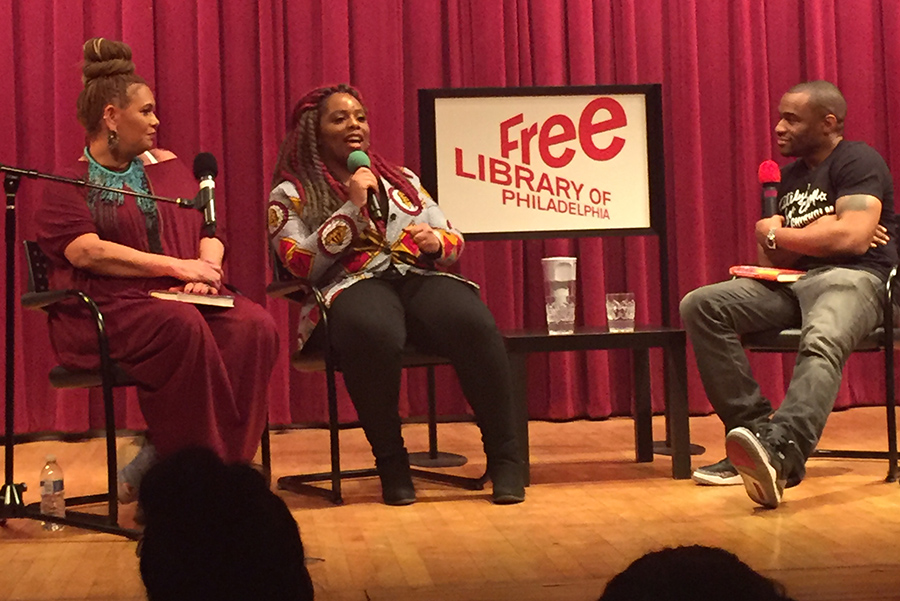More than 100 people turned out for a discussion with the co-founder of international racial-justice organization Black Lives Matter. The Free Library of Philadelphia hosted the discussion and book-signing with queer activist Patrisse Khan-Cullors on Jan. 18.
Khan-Cullors, along with Alicia Garza and Opal Tometi, founded BLM in response to the controversial acquittal of Florida community-watch member George Zimmerman, who fatally shot 17-year-old Trayvon Martin, an unarmed black man, in February 2012. A jury found Zimmerman not guilty of second-degree murder and manslaughter in July 2013.
The movement, which began as the #BlackLivesMatter hashtag, now consists of more than 40 chapters aiming to combat violence inflicted on black communities.
Khan-Cullors teamed up with writer asha bandele, who prefers spelling her name with lowercase letters, to write the book, “When They Call You a Terrorist: A Black Lives Matter Memoir.” The writers sat on a panel moderated by Marc Lamont Hill, the Steve Charles Chair in Media, Cities and Solutions at Temple University.
Khan-Cullors addressed the necessity for holding community gatherings and why she wrote her memoir.
“I’m super grateful to be in this room and I’m glad that in this moment, given who is in office, that we still have it in us to gather in these ways. I think it’s important that we stay in community, that we stay loving among each other. We can talk politics all day but there is grief in the country and the world. I think being close to one another and holding space for one another is just as important as figuring out what policies we are going to change.
“This book, for me, is an offering. It’s also truth-telling and it’s a reminder that Black Lives Matter isn’t going anywhere,” Khan-Cullors said, resulting in applause.
She talked about how some groups and individuals have referred to members of the movement as “terrorists.” Additionally, bandele said the group unfairly suffers other stigma.
“Sometimes, [terrorism] shows up in someone who is at our rally and takes credit for our work and erases the labor, the sweat, the pain, the history of black women. That’s what was happening with Patrisse and Alicia Garza and Opal Tometi — the three black women who founded Black Lives Matter.”
The audience erupted into applause before bandele pointed out how a news organization designated a man as a spokesperson for the movement shortly after the shooting of Michael Brown, an unarmed black man, in Ferguson, Mo.
Ferguson based documentary is a look at a nation in crisis
“Not only was he taking credit for work that Alicia, Patrisse and Opal had created, but also for the 80 percent of black women who were on the ground in Ferguson, black women who were trans who had come from Ohio and risked their bodies to stand in unfamiliar streets where they didn’t know how they would be welcomed,” bandele said. “All black women took a stand in Ferguson — 80 percent [of the crowd] — just as it was during the civil-rights movement, just as it was [giving] birth to the civil-rights movement.”
Khan-Cullors noted the painful aftermath of witnessing her brother being brutalized by police, which she also outlines in her memoir.
“We talk about the moment someone’s killed or we talk about the moment someone’s brutalized but we don’t talk about what happens afterwards. And what happened to that person, to the community, family. I saw the severe impact my brother’s brutalization had on all of us and what it did to my mother. I saw what it did to me and my siblings. Part of growing up born black is not just being brutalized but being completely neglected in the aftermath of it.”
During the Q&A portion of the evening, where attendees asked questions ahead of time on slips of paper, one individual asked how Black Lives Matter maintains a unified voice, despite a “lack of recognizable leadership,” like the Occupy movement.
Khan-Cullors said the organization is not “leader-less,” but “leader-full.” She also noted that the black community typically orients itself around a black male cis leader, “who is usually a preacher.”
“I talk to leaders of Black Lives Matter across the globe, weekly. I know what they’re doing. I know the work that they’ve done and I know how they’re living. They are powerful leaders.
“We’ve never claimed that we don’t have leaders. What we’ve claimed is that we don’t believe in the idea of a single charismatic leader that’s going to take us to freedom. That’s not how people get free. It takes all of us to get free. And it takes lots of different ideas about how we get to freedom. And I think that’s what’s most exciting for me about being a part of this movement.”
At the end of the panel, Hill thanked bandele and Khan-Cullors for their advocacy work.
“I hope this book gives people some insight into your journey, into your struggle and into how significant you are to this moment in history, and we will win. I have no doubt about that. But I need you to know that your work, your struggle, your sacrifice is part of that victory that will come. So thank you. I love you, and we love you.”
Visit https://libwww.freelibrary.org/podcast/episode/1679 to listen to the full conversation. Visit http://bit.ly/2DAt25j for more information on Black Lives Matter or to purchase “When They Call You a Terrorist: A Black Lives Matter Memoir.”

